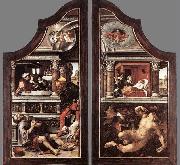Großhandels China Öl Gemälde & Rahmt Ein |
|||||||||||

|
|||||||||||
|
|
|
||||||||||||||
|
Bernaert Van Orley
Flemish Northern Renaissance Painter, ca.1488-1541 |
||||||||||||||
|
|
||||||||||||||
|
||||||||||||||
|
|
||||||||||||||
| Bernaert Van Orley
Flemish Northern Renaissance Painter, ca.1488-1541 1521 Oil on oak, 174 x 80 cm (each wing) Musees Royaux des Beaux-Arts, Brussels The triptych, which was very likely commissioned by Margaret of Austria, the governor of the Low Countries, depicts two biblical episodes illustrating the virtues of patience: the Book of Job and the parable of Lazarus the beggar and the rich man. Since the Middle Ages it had been common practice to draw a parallel between the resignation of Job and of Lazarus in the face of misfortune and the constancy of their faith in God. When closed, the triptych depicts the parable of Lazarus. At the bottom of the wings, divided into three symmetrical registers, Lazarus is dying at the rich man's gate, whilst the latter suffers eternal torment. The Italianate pose, and the monumentality and beauty of the nude are inspired by Raphael. In the centre, the rich man's feast, followed by his agony, take place in a sumptuous mansion. His wife, bringing him communion, and the physician, examining his urine, are looking after him whilst, in hell, two demons are torturing him, presenting him with a chalice writhing with serpents and a bowl filled with an infernal liquid. At the top, Lazarus' soul rises up to heaven in the form of a child, first held up by two angels in a transparent bubble, then in the bosom of Abraham. Van Orley creates his masterpiece by marrying the Flemish tradition with the new directions of Italian art and his own inventiveness. The result is a veritable profession of faith in the Renaissance, underlined by the artist's motto, "Elx syne tyt" (each in his time) inscribed on the pillar to the left of the central panel. , Artist: ORLEY, Bernaert van , Triptych of Virtue of Patience (closed) , 1501-1550 , Flemish , painting , religious |
||||||||||||||
|
Related Paintings to Bernaert Van Orley :. |
||||||||||||||
|
|
||||||||||||||
|
|
||||||||||||||
|
KONTAKTIEREN Sie UNS |







